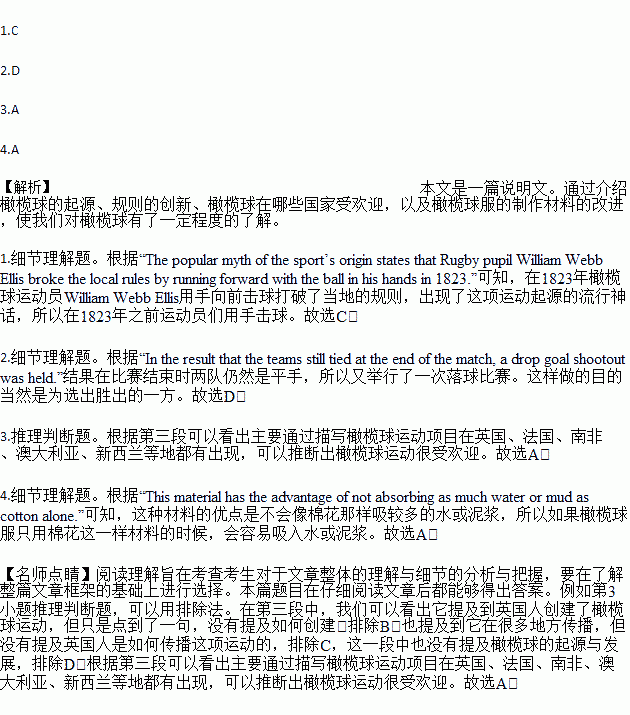题目内容
The game of rugby football was played at Rugby School between 1750 and 1859, but players were not allowed to run with it in their hands towards the other side’s goal. With no limit to the number of players per side, hundreds would participate in it, sometimes resulting in major injuries. The innovation(创新) of running with the ball was introduced between 1859 and 1865. The popular myth of the sport’s origin states that Rugby pupil William Webb Ellis broke the local rules by running forward with the ball in his hands in 1823. Rugby School produced the first written rules for their version of the sport in 1845.
In the result that the teams still tied at the end of the match, a drop goal shootout was held. The selected kickers of the two teams would have one shot at the goal each and would take turns shooting at the goal until one of the kickers missed.
In England, rugby union is widely regarded as an “establishment” sport, played mostly by members of the upper and middle classes. For example, many students at private schools and grammar schools play in rugby union. In France, rugby is also widely played and has a strong tradition in the Basque people along the border regions between Spain and France. The game is very popular in South Africa among both blacks and whites, having been introduced by English-speaking settlers in the 19th century. British colonists also brought the game with them to Australia and New Zealand, where the game is widely played. It has spread then to much of Polynesia, having particularly strong followings in Fiji, Samoa, and Tonga.
An official rugby union ball is made of leather or suitable material. Rugby shirts were formerly made of cotton but are now made of a cotton and polyester (涤纶) mix. This material has the advantage of not absorbing as much water or mud as cotton alone.
1.Which of the following statements is WRONG about the ancient rugby?
A. Players often got injured.
B. A great number of people could take part.
C. Players could run forward with the ball in their hands before 1823.
D. Written rules were first made in Rugby School in the 1840s.
2.Why was a drop goal shootout made?
A. To select outstanding players.
B. To encourage the audience’s curiosity.
C. To make the match exciting.
D. To decide the winner of the match.
3.The third paragraph mainly talks about _______.
A. the popularity of rugby sport
B. how rugby union was established in England
C. how British people spread the sport
D. the origin and development of rugby
4.Rugby shirts made of cotton alone ___________.
A. are easy to absorb much water and mud
B. are replaced by polyester shirt finally
C. are much more expensive than polyester
D. are much suitable to the players


 on and ___that Christmas together. I didn’t know it at that time,____it was the last Christmas with my mother-in-law.
on and ___that Christmas together. I didn’t know it at that time,____it was the last Christmas with my mother-in-law.